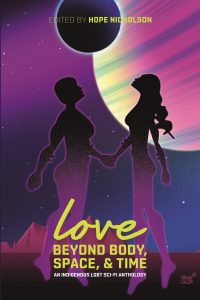For readers who are interested in having more Indigenous writers in their reading material, Love Beyond Body, Space & Time is a great entry point into Indigenous-centered science fiction. This collection of short stories seeks to showcase the ways that science fiction and aspects of Indigenity are not contradictions. In many science fiction tropes, the narrative of new planetary exploration or post-apocalyptic worlds can create a picture that reflects the harmful effects of colonialism. The possibilities that Indigenous peoples could be not only surviving, but thriving and loving in ways that affirm Indigenous notions of gender, sex and love is not something that is typically seen. This collection of short stories seeks to not only create space for these possibilities, but provides an introduction to what it means to be two-spirited, where the term comes from, and additional resources for further exploration. In “Returning to Ourselves: Two Spirit Futures and the now” Niigaan Sinclair outlines some of the histories that early colonists did not understand two-spirit people. In the early 1800s, the writings of more than one fur trader make note of the ways that they were perplexed by Ozawwendib, a two-spirit male who dressed “womanish”. Sinclair goes on to show the roles that two-spirit people had within different nations and communities, and how they were viewed by their own communities. The works cited for this short introduction piece is also an excellent resource to learn more about the roles of two-spirit people, queerness and Indigenous peoples before colonization.
The entire collection is an excellent guide into the writings and thoughts of other Indigenous writers. Included are stories by Richard Van Camp, Daniel Heath Justice, Cherie Dimaline and Cleo Keahna, to name a few. Each contributor has their own catalogue of materials that are well-worth the read on their own. As well, Grace L. Dillon in “Beyond the Grim Dust of what was to a radiant possibility of what could be: two-spirit survivance stories” gives an overview of the other writing that has been done within science fiction and queer writings, including two-spirit and where to get resources on other writing by Indigenous theorists.
One of my favourite stories is “Né łe!” by Darcie Little Badger. It is the story of a veterinarian, Dottie, who is Lipan Apache and on a nine month trip to Mars. The mission gets interrupted, and she gets woken up from her stasis sleep by another queer Navajo woman Cora when her vetrinary skills are needed. For me, the story had many unexpected elements that made it feel very surprising and charming. It is unexpected to see a queer Indigenous female doctor as a main character in a short story; just as much as it is to find love on a journey to Mars.
I also really enjoyed “Transitions” by Gwen Benaway. It is set in the near future, in Toronto, Ontario. It is the story of a two-spirited trans person who is near the beginning of their transition. As part of this, they enroll themselves in a new medication trial which is supposed to have better effects than hormones. However, they begin to have hallucinations and is encouraged by an Elder to use ceremony to come back to her spirit. This story is a beautiful reminder that Indigenous futurisms can be seen as the time that we are living in right now. The ancestors of our past can override what we hail as modern medical breakthroughs. As an Indigenous person who used to live in Toronto, I’m always excited when I can recognize different places and institutions that helped to shape my experience of the city.
Overall, “Love Beyond Body, Space and Time” is an accessible and thorough introduction to both science fiction and two-spirit realities for people who may not have a great deal of experience with either. The short story formats offer a wide variety of interpretations of science fiction; as well as what it means to have experiences with both Indigenity and queerness. A short read that is well-worth checking out, I recommend this with 4 out of 5 interplanetary stars.
Sheila is a queer Métis woman, living in her home territory of Edmonton, AB, Canada. She has worked in a number of libraries across Canada, but being back in the public library has given her the space to rekindle some love with books and reading. She also co-hosts a podcast about Indigenous publishing called masinahikan iskwêwak (which is Cree for Book Women) with two other Métis librarians. The podcast can be found at https://bookwomenpodcast.ca/; and Sheila tweets at @SheilaDianeL.

